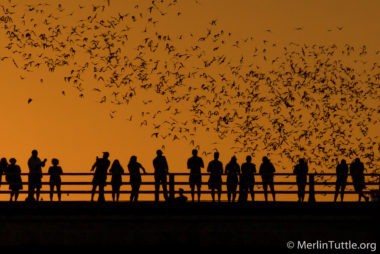Bat Flash: Countering Misinformation and Championing Evidence-Based Science
On March 6, 2024, the Wall Street Journal presented findings from the University of Leeds in their opinion piece, “Why Scientists Love Chasing Bats; The
A disappointing number of authors and publishers are spreading the false narrative that bats are exceptionally high-risk sources of deadly viruses. The July 12 edition of The Washington Post contained an article titled, “Why do bats have so many viruses?” The author, Rachel Ehrenberg, was apparently unaware of the most recent analysis of viral risks.
We urge Rachel and other Washington Post journalists to review Mollentze and Streiker’s April 28, 2020 comprehensive analysis, published in the Proceedings of the National Academy of Science. Their paper titled, “Viral zoonotic risk is homogeneous among taxonomic orders of mammalian and avian reservoir hosts” concluded that bats are no more likely than other animals to host disease.
Virus hunters have focused search efforts disproportionately on bats, apparently because bats are exceptionally easy to sample in large numbers and have few defenders. Referring to the Covid-19 outbreak, Zhang and Holmes concluded that surveillance of coronaviruses in animals other than bats is critical to protecting against future outbreaks.
Sensational speculation, exaggerating bat association with scary viruses, has led to a serious bias that impedes our understanding of viral pandemics and creates a perfect storm of media publicity. This feeds into our broader academic crisis—the misallocation of large grants for splashy, attention-getting “research” that promotes career advancement over high-quality, reproducible scientific investigation. Such bias threatens to misdirect limited public health resources and halt, or even reverse, decades of conservation progress.
It’s time publishers, authors, researchers, and decision-makers let go of the premise that bats are uniquely dangerous sources of disease and end biased sampling and unsupported speculation. Instead, we need to identify true sources of human infection and insist on accurate reporting that leads to actual prevention.
Our combined voices can make a difference. We invite you to politely share your opinion in your own words with the producers and editors. You may find our resources, Give Bats a Break and Good Intentions Can Still Leave a Bad Taste, additionally helpful in composing your personal reply and discussing these topics with others. Editors do take notice. Remember, your response can be very simple such as, “I appreciate the attempt to defend bats, but am disappointed to see further reporting of the false assumption that bats are uniquely dangerous sources of disease.” Editors simply need to know you like or dislike an article for you to have an impact. It’s numbers that count and bats need all of you! Tell a friend about bat values and how they can help.
Please lodge your polite, but firm complaint as soon as possible. Thank you for your vigilant support of bats, their conservation, and MTBC.

Love our content? Support us by sharing it!
On March 6, 2024, the Wall Street Journal presented findings from the University of Leeds in their opinion piece, “Why Scientists Love Chasing Bats; The
Response to Misleading Scientific American Bat Story I am responding to the article titled, “A Secret Weapon in Preventing the Next Pandemic: Fruit Bats,” which
Believe it or not, bats have one of our planet’s finest records of living safely with humans. Despite frequent claims to the contrary, they harbor
The series Curious Kids, hosted by The Conversation, is designed to provide expert answers to questions asked by children from around the world. The December
2024 © Merlin Tuttle’s Bat Conservation. All rights reserved.
Madelline Mathis has a degree in environmental studies from Rollins College and a passion for wildlife conservation. She is an outstanding nature photographer who has worked extensively with Merlin and other MTBC staff studying and photographing bats in Mozambique, Cuba, Costa Rica, and Texas. Following college graduation, she was employed as an environmental specialist for the Florida Department of Environmental Protection. She subsequently founded the Florida chapter of the International DarkSky Association and currently serves on the board of DarkSky Texas. She also serves on the board of Houston Wilderness and was appointed to the Austin Water Resource Community Planning Task Force.
Michael Lazari Karapetian has over twenty years of investment management experience. He has a degree in business management, is a certified NBA agent, and gained early experience as a money manager for the Bank of America where he established model portfolios for high-net-worth clients. In 2003 he founded Lazari Capital Management, Inc. and Lazari Asset Management, Inc. He is President and CIO of both and manages over a half a billion in assets. In his personal time he champions philanthropic causes. He serves on the board of Moravian College and has a strong affinity for wildlife, both funding and volunteering on behalf of endangered species.